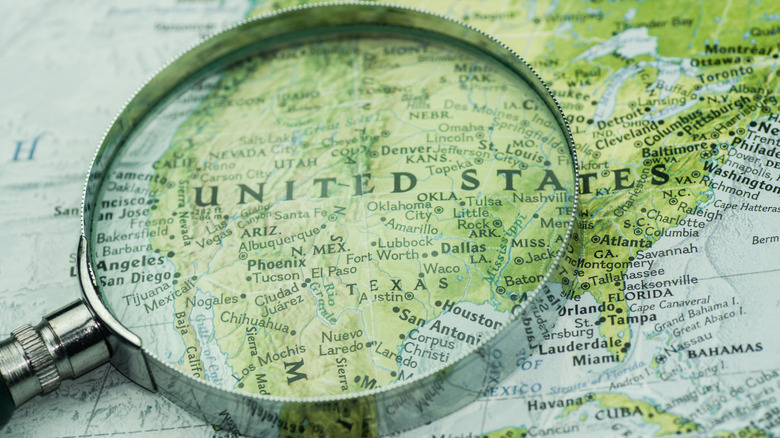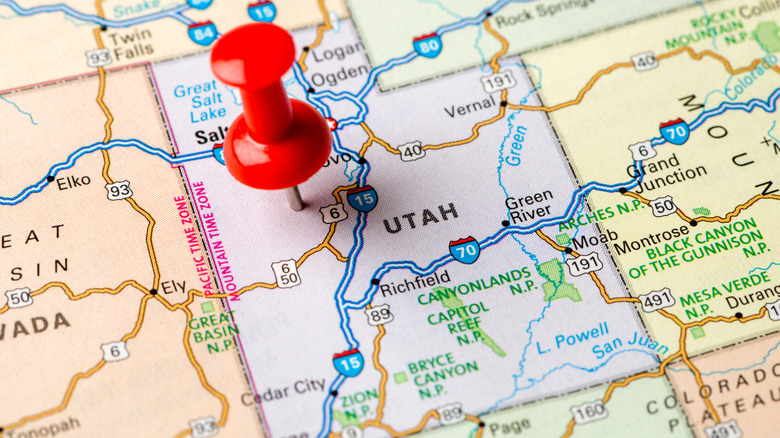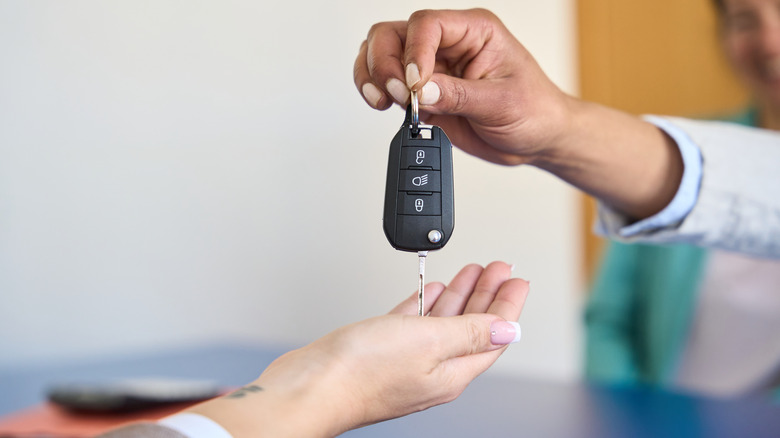Are Car Dealerships Really Banned From Selling Vehicles On Sunday?
In many states, buying a car at a dealership on a Sunday is no different from buying one on any other day of the week. In fact, it might come as a surprise to some residents of California or New York to realize that the opportunity to visit a car dealership on a Sunday isn't something that can be done everywhere in the country. 13 States prohibit car dealerships from opening on Sundays, and six other states have partial restrictions.
These restrictions are part of the USA's Blue Laws, which date back to the 1600s and originally covered a whole range of activities. Opening your barbershop in Colorado on Sunday was illegal in the early 20th century. In Texas, you couldn't buy clothing, furniture, jewelry, or electrical goods on Sundays until the law was changed in 1985. Bergen County in New Jersey has stricter blue laws than the rest of the state. It doesn't just ban car dealerships from opening on Sundays, retailers are also prohibited from selling clothing, furniture, and household items.
However, in most of the country, Blue Laws these days only apply to hunting, alcohol, and cars. Sunday car purchasing laws vary across states, with different exceptions and penalties in place. Even when selling a car on a Sunday isn't illegal, many dealerships still choose not to open on Sundays, so it's always best to check beforehand wherever you are.
States with full bans
The 13 states with full bans on car sales on a Sunday are Colorado, Illinois, Indiana, Iowa, Louisiana, Maine, Minnesota, Missouri, New Jersey, North Dakota, Oklahoma, Pennsylvania, and Wisconsin. The exact law depends on which state you're in. Some states adopt a straightforward approach. North Dakota's law, for example, simply states , "A motor vehicle dealer may not sell a motor vehicle on Sunday."
Oklahoma has a much wordier way of saying the same thing, specifying that you are not allowed to "open, operate, or assist in keeping open or operating any place or premises or residences whether open or closed, for the purpose of selling, bartering, or exchanging, or offering for sale, barter, or exchange, any motor vehicle or motor vehicles, whether new, used, or secondhand, on the first day of the week, commonly called Sunday." However, despite the differences in wording, the underlying goal across these states remains the same: no car sales on a Sunday.
However, there are some exceptions. In some places, like Illinois, Indiana, and Missouri, you can still buy a motorbike or an off-road vehicle on a Sunday. Colorado specifically excludes boats and snowmobiles from the Sunday ban, and Oklahoma allows the sale of antique and classic cars. A few states, including Maine and Wisconsin, provide exceptions for those who observe the Sabbath on Saturdays. If, for religious reasons, you refrain from doing business on a Saturday, you may open your car dealership on a Sunday.
States with partial bans
While some states ban car dealerships outright from operating on Sundays, others take a slightly different approach. In Texas and Utah, the law stipulates that you cannot be open on both Saturday and Sunday and must close for business on one of those days. Some states have partial restrictions on selling cars on Sundays. Maryland allows Sunday car sales in four of its counties, Charles, Prince George's, Montgomery, and Howard.
Michigan restricts Sunday sales to only those counties with a population of less than 130,000. In 1953, when the law was passed, there were only eight counties with a population of more than 130,000. Now, there are more than twice that many. In Clark County, Nevada (the home of Las Vegas), you can buy and sell second-hand cars on a Sunday, but not new ones (provided the second-hand vehicles aren't being sold at the same location as new ones). Rhode Island is okay with car dealerships opening on Sundays, but they are limited to opening hours of between 12 p.m. and 6 p.m.
What are the advantages of these bans?
Although it seems paradoxical that Sunday closing should be enshrined in law for car dealerships, and not, for example, for jewelers, swimming pool salespeople, or realtors, the car sales industry is supportive of the blue laws and has campaigned to keep the rules in place. The Minnesota Automobile Dealers Association (MADA) says that there are "sound economic and social reasons for the prohibition on Sunday motor vehicle sales to remain in effect".
This Honda dealer in Illinois supports the ban, stating on its website that dealers "appreciate knowing they at least one guaranteed day to spend with their family." Credible car dealerships also want to attract the best staff, and guaranteed Sundays off is a good way to do this. Closing showrooms on Sundays also saves money.
As a car isn't an impulse purchase, consumers who need a new car will still buy one on another day of the week if they can't purchase one on Sunday. Car dealerships say they don't lose money by remaining shut on Sundays. MADA states, "Dealerships will sell no more cars in a year but will increase overhead by adding another day to their operating week — it will increase dealers' costs by approximately $20 million annually".
Are the laws likely to change?
From a buyer's perspective, many of whom work Monday to Friday jobs, it would actually be more useful if dealers shut on a weekday rather than half the weekend. As one Redditor put it, "It's hard enough buying a car without needing to take a day (or more) off of work to do it." However, buying a car is a complicated business, and it's easy to get things wrong. Lots of people like being able to go to car dealerships when they're closed so they can look at cars without being hassled by pushy salespeople.
Dealerships in many states are keen to protect Sunday closing. They don't seem worried that they'll lose sales to neighboring states, even though all the Blue Law states — except Wisconsin — are next to states without legal restrictions about selling cars on Sundays. There have been numerous bills proposed to overturn these laws, but none have been successful. Utah Senator Stephanie Pitcher proposed (and abandoned) a bill to allow dealerships in Utah to open all weekend. In an interview with KSL TV, she asked, "Why are we making carve-outs for car dealerships, but not other industries?"
It's a good question. But car dealerships in the 13 banned states are in no hurry to change things. They have all the benefits of Sunday closing — lower overheads and happier staff — without the worry of losing sales to their competitors. As Oklahoma Car Dealer Bob Brice said to radio station KGOU, "Sunday is a day for the Lord — and football,"




